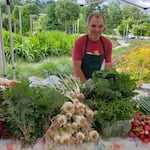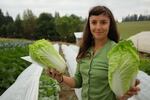For years, farmers markets have served as community gathering spaces where people can come together, shop locally, see their neighbors. But with all but the most essential businesses closing in the face of a global pandemic, farmers markets say their fundamental service is more important than ever: getting fresh food into the community.
That’s what they’re doing — for now, at least.
"The Oregon Department of Agriculture came out with some clarification this week that farmers are considered essential businesses and services," said Kelly Crane, executive director of the Oregon Farmers Market Association.
That spares farmers from Gov. Kate Brown’s proclamation prohibiting gatherings of more than 25 people, but it's not clear what it will mean for the markets where many sell their wares.
With the coronavirus pandemic causing unprecedented layoffs, Crane said she expects more and more people to rely on farmers markets to shop with federal Supplemental Nutrition Assistance Program credits.
It’s not just consumers who are struggling to pay for essentials like food, though — farmers are feeling the pinch too.
"Our farm sells about half of our product through restaurants, but as you know, all of the restaurants in Portland are no longer able to do any dine-in service," said Lili Tova, the owner of Flying Coyote Farm in Sandy.
It's still very early in the growing season, so her team is working hard to figure out what comes next–and whether her weekly booth at the Hollywood Farmers Market in Portland will be part of that plan.
"It’s been a huge change for us,” she said. “We're just looking ahead to figure out well, what are we going to need to do to anticipate what's coming?"

A vendor at the South Waterfront Farmers Market in Portland
Portland Farmers Markets Association
In the short term, markets are rushing to create more space for customers to browse.
Crane said that, unlike a grocery store, markets can space booths farther from one another. “If you’re used to your local market looking compact and dense and lots of crowds, you’re going to see the footprint will have blown up and expanded,” she said.
Crane also said some markets are putting colored tape on the pavement to show appropriate social distance, and prevent customers from touching the produce as they shop.
"One market manager said she’s even considering walking around with a bullhorn this weekend,” ready to warn if shoppers are getting a bit too close together, Crane said.
Still, Crane acknowledges that markets are going to need to evolve if they want to survive a summer of social distancing. "I think everybody has online models in mind," she said.
She envisions a coordinated program where you could go to your favorite market’s web site, shop from all your favorite vendors and pick up a box of fresh produce curbside, ready and waiting.
"Farmers markets are already this natural aggregation and distribution hub," she said. "They have vendors, they have customers—it's already kind of built up in that way."

Lili Tova of Flying Coyote Farm in Sandy
Flying Coyote Farm
Tova, the owner of Flying Coyote Farm, is no stranger to this type of program. Her farm runs a community supported agriculture, or
, program, which boxes up produce for consumers to pick up, either at her farm in Sandy or at several drop-off locations in Portland.
She’s interested in the ease and convenience an online platform could provide. Still, she said, losing that face-to-face interaction at her booth in Hollywood would be a big blow to the culture of her business.
"It's almost like a family to me," she said. “We see the same people at the market every single weekend. We know what's going on with their families and they share recipes with us.”
With increasingly restrictive orders from local government expected in the coming days, Crane acknowledges these strategies are important for everyone involved: for the farmers, the consumers and the markets themselves.
It's unclear whether markets will still be deemed an essential service under a stay-at-home order similar to the one issued this week in California. Even if markets do stay open, Crane expects attendance at local markets will decrease.
Still, she says online ordering is never going to take the place of the in-person farmers market experience. “This is kind of a Band-Aid,” Crane said. "It could be important for preserving markets' viability for the time being. And then later we can get back to all the lovely interactive pieces that make farmers markets so special."
Use the audio player above to hear the full conversation from OPB’s “Weekend Edition.”
